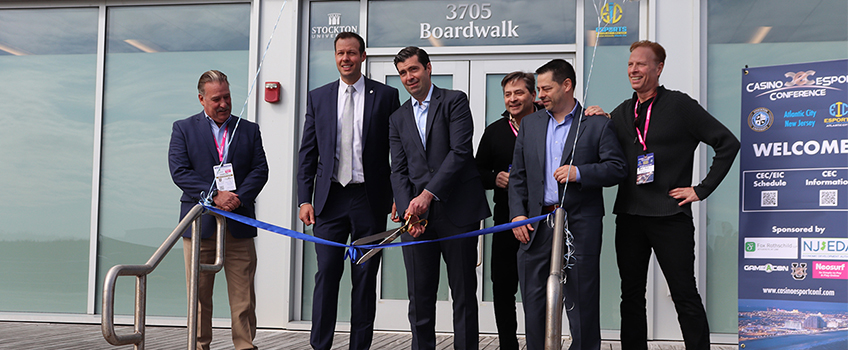Atlantic City, N.J. — The ribbon cutting Tuesday of the Esports Innovation Center (EIC) at Stockton University is helping to put New Jersey and Atlantic City on the map
as one of the leaders in this new and growing industry.
That’s the message Tim Sullivan, the Chief Executive Officer of the New Jersey Economic
Development Authority (NJEDA), wanted to make clear during his keynote address at
the first Casino Esports Conference (CEC) on the East Coast, held at Stockton’s Atlantic
City campus on Oct. 18 and 19.
The conference took place in the Fannie Lou Hamer Event Room in the John F. Scarpa
Academic Building and featured panel discussions on the state of esports, how the
casino industry can get involved through wagers and hosting events, and how Atlantic
City can grab a piece of the $1.38 billion in global revenue esports is expected to
generate in 2022.
The EIC at Stockton is located on the Boardwalk as part of the university’s Residential Complex. The center is a nonprofit that was set up in partnership with the NJEDA and Stockton
to promote esports in South Jersey and Atlantic City.
“The EIC will be a driver of strategic workforce development and will help to attract
industry-supporting businesses and events,” said NJEDA Chief Executive Officer Tim
Sullivan. “Governor Phil Murphy’s economic development plan is focused on bolstering
high-growth sectors that create inclusive career opportunities. The EIC, as a center
of knowledge and innovation, is adding to the momentum in this emerging and particularly
exciting industry. This week’s ribbon cutting is an important step forward in accomplishing
Governor Murphy’s vision for a stronger and fairer NJ economy”.
Sullivan added that the EIC is the latest addition to Atlantic City’s resurgence,
which is bringing jobs, private investments, and new activity to the city, and showing
companies that there is much do to in the city in addition to casinos.
But convincing casinos to get more involved with esports is definitely a big part
of the EIC’s mission, said Executive Director Andrew Weilgus.
“We want to help define and craft a casino strategy where they can take advantage
of this growing boom of esports, both with events that come into Atlantic City, as
well as potential wagering opportunities,” Weilgus said.
Weilgus said the EIC is also partnering with several local community organizations,
like Stockton and the Boys and Girls Club of Atlantic City, to hold events promoting
esports. The center also wants to eventually attract other esports companies to set
up locations and build games in Atlantic City.
“We really believe we are going to create a great ecosystem where the next generation
of esports games can be built and tested here,” Weilgus said. “All of these technologies
are advancing. They are in their infancy. The center is here to promote and craft
these ideas.”
We really believe we are going to create a great ecosystem where the next generation
of esports games can be built and tested here. All of these technologies are advancing.
They are in their infancy. The center is here to promote and craft these ideas.”
Stockton has seen first-hand how quickly interest in esports has grown, said Stockton
Chief Information Officer Scott Huston, who spoke at one of the conference’s sessions.
The university’s esports team has grown from just 12 students to 2019 to nearly 800
today, he said. Earlier this year, Stockton’s Rocket League team finished second in
the world in a competition.
“There’s a lot of opportunity for competitive play, but also we see a lot of students
who aren’t the hard-core video gamers, but it fits the lifestyle they are living and
they want to be involved,” Huston said. “For us, it’s all about providing another
avenue for students to fit into the university.”
In addition to getting more students involved with playing esports, Stockton also
sees an emerging need and opportunity to educate students about the growing field.
This fall, the university debuted its first esports and event planning course, which
will be offered again in the spring, said Noel Criscione-Naylor, an associate professor
of Hospitality and Tourism Management.
“There’s a huge connection to hospitality, tourism and event management, which is
our program,” she said. “Students have to have the fundamentals of what does it mean
to execute an event and at the same time what are some of the computer skills and
problem solving that’s necessary (with esports events).”
Criscione-Naylor added the university is in the process of establishing a Bachelor
of Science degree in Esports Management with an anticipated fall of 2023 launch.
“We see it as a way to create a diverse skill set in our students, and we are working
very hard and very fast to make sure we have a program that will make our graduates
competitive in the market as it emerges,” she said.
Huston said Stockton also sees an opportunity to educate traditional casino and hospitality
executives about the esports industry.
“They are going to need to learn esports in order to make better decisions,” he said.
“They can come back, get a certification or pick up a degree to learn how to make
these modern choices and really cater to this industry as it continues to take off.”
And with new course offerings and the establishment of the EIC, Sullivan believes
Stockton and New Jersey “are poised to have a leadership position in this industry.”
“This center is doing cutting-edge policy and innovation work and is bringing together
higher education research to attract big and small companies,” Sullivan said. “This
innovative synergy will bring long-term change in Atlantic City, Atlantic County,
and South Jersey.”
— Story and photos by Mark Melhorn
